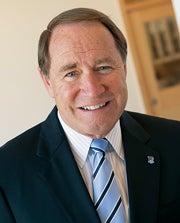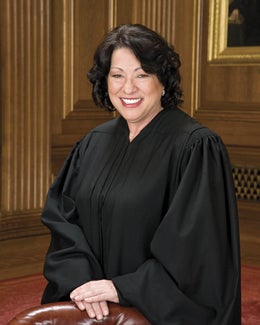President’s View
“My life’s story touches people because it resonates with their own circumstances.”
–Sonia Sotomayor

By the time you receive this issue of QuadAngles, we will have celebrated the University’s 130th Commencement. And many of you will already be aware that our speaker on this momentous occasion was the Honorable Sonia Sotomayor, Associate Justice of the Supreme Court of the United States. What a proud moment in our history!
In preparation for meeting Justice Sotomayor, many of us read her best-selling memoir, My Beloved World. In the preface to her candid and honest book, Justice Sotomayor offers a profound reflection: “My life’s story touches people because it resonates with their own circumstances. The challenges I have faced—among them material poverty, chronic illness, and being raised by a single mother—are not uncommon, but neither have they kept me from uncommon achievement.”
Any objective assessment of Justice Sotomayor’s life and career would concur that “uncommon achievement” is, indeed, an accurate characterization of all that she endured and all that she accomplished. From public housing projects in the South Bronx, the young Sonia Sotomayor arrived at Princeton University, where, in her own words she felt like “a visitor landing in an alien country.” But as she gained confidence, she became an activist; her leadership resulted in the hiring of Latino faculty and introduction of a seminar on Puerto Rican history and politics. Activism—especially when it comes to women and minorities—is a thread that is pulled through Justice Sotomayor’s distinguished career working at almost every level of our judicial system: prosecutor, corporate litigator, trial judge, and appeals court judge.

At Yale Law School, Justice Sotomayor was known to stand up for herself and not be intimidated. Clearly she was not intimidated by the Major League Baseball owners in 1995, when the injunction she issued ended the baseball strike that had caused the World Series to be cancelled the previous fall.
Justice Sotomayor is a pioneer in the truest sense. She is not content to break down barriers for herself but rather seeks out ways to help young people whose backgrounds mirror her own. Open and unapologetic about the doors affirmative action opened for her, she believes, “Until we get equality in education, we won’t have an equal society.” This belief is perfectly aligned with our own philosophy at URI, where programs like Talent Development fulfill the purpose Justice Sotomayor defines for affirmative action: “To create the conditions whereby students from disadvantaged backgrounds could be brought to the starting line of a race many were unaware was even being run.”
As I write this message I don’t know what Justice Sotomayor plans to tell the class of 2016 on Sunday, May 22. What I am confident of is that she is an excellent and admirable role model, and dramatic evidence of the power of education to transform a life. And she embodies much of what we cherish about American ideals. Certainly, I very much value this wise counsel from her memoir: “You cannot value dreams according to the odds of their coming true. Their real value is in stirring within us the will to aspire. After a time you may recognize that the proper measure of success is not how much you’ve closed the distance to some far-off goal, but the quality of what you’ve done today.”
Wishing all of you the courage to dream and the will to aspire. And a wonderful summer.
David M. Dooley
President, University of Rhode Island
 Home
Home Browse
Browse Close
Close Events
Events Maps
Maps Email
Email Brightspace
Brightspace eCampus
eCampus


